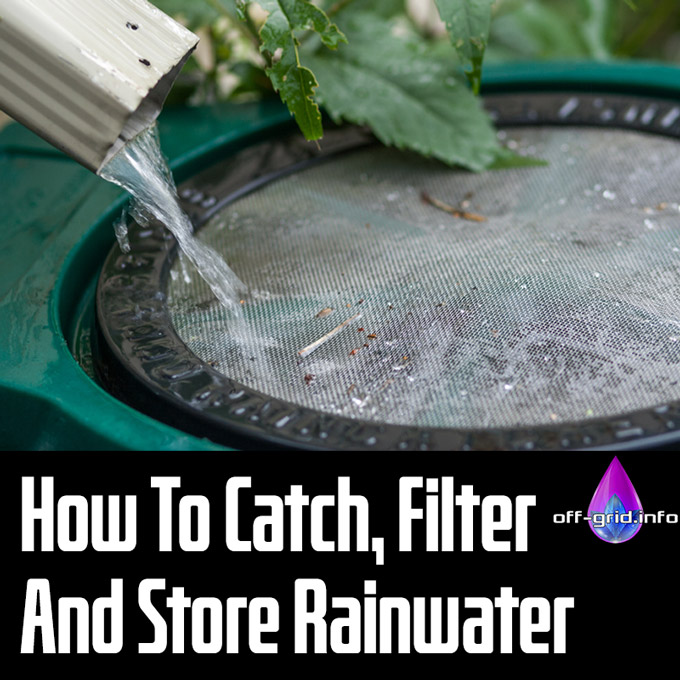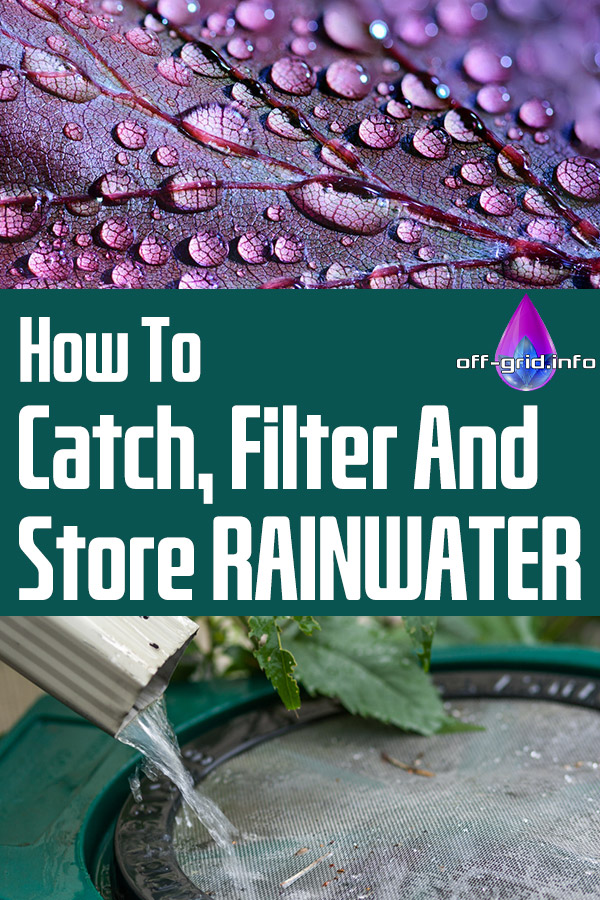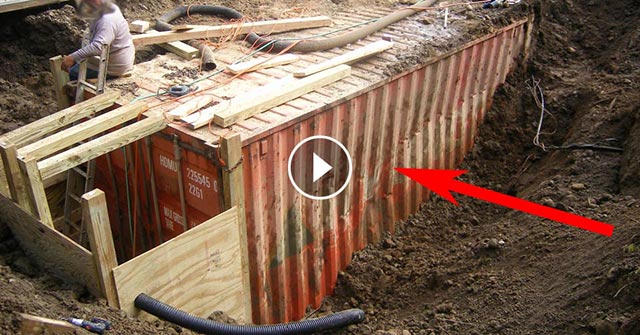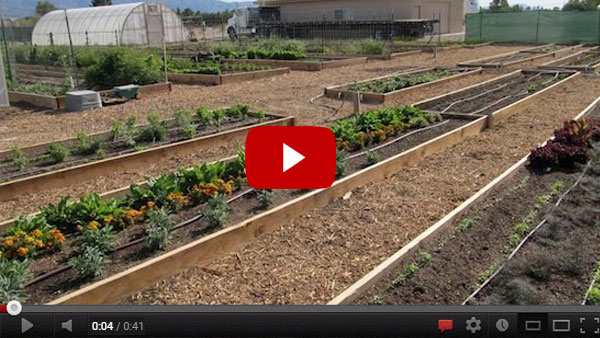Click Here To Join Our Telegram Channel for FREE daily tutorials!

How To Catch Filter And Store Rainwater. Photo – shutterstock.com (under license)
Fresh water sources are becoming increasingly depleted as the demand for residential, agricultural and industrial use continues to rise. Learning to harvest, store and manage water supplies is becoming an ever more important survival skill and will continue to do so.

One of the purest types of water is rainwater when it falls through the unpolluted air directly into a clean container. However, the rain that falls in cities or flows across open air surfaces such as outdoor basins or roofs is another story. Run-off rainwater can be a health hazard due to contamination from air pollution, pesticides, animal feces, dead insects, car exhaust and fuel spillage, and even lead paint. If you are using the rainwater for toilet flushing or lawn watering (two of the major uses of residential water supply) then the purity required is not quite as high. But you will need to minimize or eliminate contamination if you intend to use rainwater for drinking, by using good filtration.
If you live in the U.S., collection of rainwater – shockingly – is not actually legal in some states. It’s fairly absurd that what falls from the sky can be owned by someone. But there are municipalities, counties, and cities that prohibit rainwater harvesting. In areas that do allow it, you have to be aware of local or state regulations for rainwater collection systems and storage, equipment, and methods. Please research and seek the appropriate advice from your local government’s environmental, zoning, building and health departments before you install a rainwater storage system.
There are several ways to assure the rainwater you harvest is clean. Your roofs and eaves trough must be clear as possible. You can use a mesh strainer to remove leaves and large debris. The rainwater must be harvested in a tank that is channeled to a biosand filter. You can also use a small air bubbler to keep the water aerobic in the storage tanks. Adding bleach in the correct quantities to the storage tanks can also help prevent the growth of algae and this is the method utilized by municipal water supplies.
The rainwater should be stored in a clean holding tank or other nontoxic containers such as food-grade plastic barrels. Add a first-flush diverter to improve rainwater quality. This first-flush device keeps the impurities and debris from entering your holding tank.
Commercial water filters are effective against different types of contamination. Common filter types used for rainwater collection systems include activated carbon, ceramic, and membrane. Filters are tasked to remove parasites and bacteria, but they are not typically relied upon to remove viruses. You can add iodine to the water or use UV sterilization to kill viruses. Further carbon filtering is a must after iodine treatment to remove excess iodine.
The U.S. Centers for Disease Control and Prevention does not recommend using rainwater as a drinking water resource without disinfection, filtration, and regular maintenance. The CDC is in fact strongly against allowing rainwater into a household drinking water system. So as a homeowner, you must take responsibility for the safety of your own rainwater collection system.

If water supply is limited but not non-existent, consider using your rainwater for non-potable purposes first: Garden watering, cleaning and other outdoor uses are ideally suited.
Outlines below are several do’s and don’ts to keep your system running with every fall of rain:
• Place the storage tanks or barrels under a downspout. Do not put them near utility services or septic tanks.
• Never leave any openings to the barrel uncovered.
• Do not drink unfiltered and untested water.
• Overflow ports / additional tanks are vital when the barrels receive much water.
• The tank needs to be drained every three to five years.
• Seasonal maintenance schedule and regular cleaning of the tanks is also important.
Image For Pinterest:

How To Catch Filter And Store Rainwater. Photos – shutterstock.com (under license)

This Crazy Off Grid Device Literally Makes Drinkable Water From Fresh Air:
According to NASA, the U.S. is expecting a 100-YEAR LONG MEGADROUGHT.
It's already begun. Ask the farmers in California. They know.
Every survivalist knows that water is of critical importance. You NEED an independent water source that you can count on!
As an interesting "survival rehearsal" - imagine that you turned the tap on right now and nothing came out. How long would you last?
But what if there was another water source literally hidden in plain sight. That's right, I'm talking about the atmosphere!
The amazing thing about getting water from the natural moisture in the air... is that it is ALWAYS available.
This gives you real water security!
Learn more about how to tap into "Nature's secret water reservoir" and stay hydrated when TSHTF!
Watch the video:
😳 What Tinnitus Does To Your Brain Cells (And How To Stop It)
After 47 years of studies and countless brain scans done on more than 2,400 tinnitus patients, scientists at the MIT Institute found that in a shocking 96% of cases, tinnitus was actually shrinking their brain cells.
As it turns out, tinnitus and brain health are strongly linked.
Even more interesting: The reason why top army officials are not deaf after decades of hearing machine guns, bombs going off and helicopter noises…
Is because they are using something called "the wire method", a simple protocol inspired by a classified surgery on deaf people from the 1950s...
Most People Don't Have The Guts To Try This:
An amazing discovery in an abandoned house in Austin, Texas: A lost book of amazing survival knowledge, believed to have been long vanished to history, has been found in a dusty drawer in the house which belonged to a guy named Claude Davis.
Remember... back in those days, there was no electricity... no refrigerators... no law enforcement... and certainly no grocery store or supermarkets... Some of these exceptional skills are hundreds of years of old and they were learned the hard way by the early pioneers.
>> Click here to find out about them now
We've lost to history so much survival knowledge that we've become clueless compared to what our great grandfathers did or built on a daily basis to sustain their families.
Neighbors said that for the last couple of years Claude has tried to unearth and learn the forgotten ways of our great-grandparents and claimed to have found a secret of gargantuan proportions. A secret that he is about to reveal together with 3 old teachings that will change everything you think you know about preparedness:
>> Click Here To Watch The Video <<
What REALLY Happens When You Bury a Shipping Container? (Hint: It's A Bit Crazy...)
Shipping containers are all the rage - but if you are thinking about buying one, you MUST watch this video first:
Do not, I repeat do NOT do what these lunatics did! Can you spot the "fatal mistake" they made?
There's a general belief that if you bury a shipping container you can create an awesome root cellar / storm shelter / survival bunker.
But is a shipping container strong enough to handle the pressure?
Watch the video to see what happens:
What Really Happens When You Bury a Shipping Container? (Click To Watch Video)

I Can't Help Showing This Off:
If you haven't heard of Claude Davis yet do yourself a huge favor and watch this video.
One of the smartest guys I ever had the pleasure of meeting, Claude set-up a unique prepping system that changed his life forever.
I already tried it myself and let me tell... you I was completely blown away... His surprising tactics could make your life easier and give you the peace of mind you deserve.
Don't just take my word for it... watch his short video and decide for yourself.
>> Click Here To Watch The Video <<

More Off-Grid And Survival Resources:












